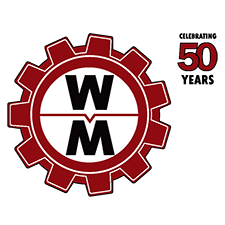Is your shop looking to invest in a new bending machine?
Though there are a range of bending machines on the market, roll benders are the clear choice for most metal pipe and sheet applications.
 Fabricators rely on them to form arcs and rings. They cradle the bottom of the material you insert while pressing its ends to a certain degree.
Fabricators rely on them to form arcs and rings. They cradle the bottom of the material you insert while pressing its ends to a certain degree.
But selecting the right machine is difficult, as they come in three categories based on their number of rolls.
Here are recommendations and bits of information to help you choose a 2-, 3-, or 4-roll bender:
2-Roll Bending Machines
2-roll bending machines play a unique role for fabricators. They’re used for slightly different applications than their 3- and 4-roll counterparts, which focus on larger metals.
Specifically, 2-roll bending machines are suited for:
- Thin, small material. Fabricators can precisely bend materials that are less than 24 inches wide and 3/16 of an inch thick. Other benders don’t accommodate these sizes.
- High production runs. A reliable 2-roll bending machine will boost your shop’s productivity, quickly and accurately bending large batches of small cylinders into a uniform diameter without leading and trailing flats.
Recommended Model:
The Di-Acro 2-Roll Bending Machine is built for impressive precision and production, as it has a rolling speed of 15 feet per minute (FPM). The motor, which has a one horsepower rating, helps it handle 16 gauge mild steel.
With a pneumatic lock-up, operators can also expect improved efficiency as it quickly completes runs.
3-Roll Bending Machines
3-roll bending machines are similar to 4-roll models. One difference, in terms of features, is 3-roll benders have difficulty adding a CNC control. But the main difference is that a 4 roll machine will have a smaller flat spot on the leading and trailing edges.
3-roll bending machines have a slightly lower initial cost, but tend to be considered older technology and less popular than 4-roll machines.
The technology is typically used for:
- A range of material. They are primarily used to bend plates thinner than an inch. However, they can be used for heavy duty applications involving materials that are three to four inches thick.
Recommended Model:
The Davi Hydraulic 3-Roll Bender comes in two models. They can both handle plates between three and four inches thick. Best for limited production runs, they are both highly accurate because the unique feeding process eliminates slippage.
4-Roll Bending Machines
Fabricators often choose 4-roll bending machines for a variety of applications.
Usability is a big reason why this is the case. 4-roll benders are better suited to have CNC controls, since the material is held between two pinch rolls and the position can be controlled. They help operators comfortably oversee production runs, as a computer monitors accuracy and throughput volume.
As well as advanced controls, fabricators use 4-roll bending machines for:
- Large material. Like 3-roll versions, these bending machines can handle plate thicknesses from about half an inch to four inches, depending on the model.
- High production runs. With automated rolling centres, many 4-roll benders reduce the time it takes to run basic applications. Short cycle times create opportunities for larger throughputs.
- Accuracy. CNC controls will improve accuracy. Your shop can rely on a 4-roll bender for applications that require a wide variety of shapes.
Recommended Model:
The Davi Hydraulic 4-Roll Bender is one of the most versatile bending machines available. This is largely due to its library of shapes, allowing operators to program parts quickly.
It doesn’t skimp on precision, either. Automatic braking ensures accurate plate feeding.
Before investing in any piece of fabrication technology, you should review your shop’s priorities. Once you determine your needs, you will be able to choose the right bender. We also recommend consulting an experienced metal forming machine dealer.
The ideal bending machine for your shop should be versatile. It should capably handle common material, as well as special materials and various shapes.
>> Interested in learning more about bending machines or making a purchase? Contact Westway Machinery today for the largest selection of metal forming technology in Ontario.
Like this post? You’ll also enjoy:

